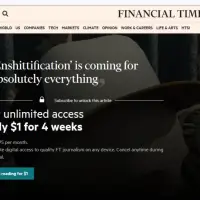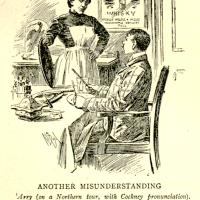 Hi folks, here is a thoughtful post on one of my favourite lines in The Lord of the Rings. I would encourage you to check it out and follow Stephen Winter‘s thought-of-the-week short essay on the trilogy. “Wisdom from the Lord of the Rings” is consistently well written, and Stephen says things that spark my imagination.
Hi folks, here is a thoughtful post on one of my favourite lines in The Lord of the Rings. I would encourage you to check it out and follow Stephen Winter‘s thought-of-the-week short essay on the trilogy. “Wisdom from the Lord of the Rings” is consistently well written, and Stephen says things that spark my imagination.
Also, just for free, in this essay, you have a Canadian blogger (me) sharing an essay from an English writer (Stephen) about an African-born British writer (Tolkien) that quotes a great American figure (Abraham Lincoln). It is the kind of nonsense link I like to make when we are generally sitting at table together talking good sense.
I believe in open access scholarship. Because of this, since 2011 I have made A Pilgrim in Narnia free with nearly 1,000 posts on faith, fiction, and fantasy. Please consider sharing my work so others can enjoy it.
Like this:
Like Loading...
Related

About Brenton Dickieson
“A Pilgrim in Narnia” is a blog project in reading and talking about the work of C.S. Lewis, J.R.R. Tolkien, the Inklings, L.M. Montgomery, and the worlds they created. As a "Faith, Fantasy, and Fiction" blog, we cover topics like children’s literature, myths and mythology, fantasy, science fiction, speculative fiction, poetry, theology, cultural criticism, art and writing.
This blog includes my thoughts as I read through my favourite writings and reflect on my own life and culture. In this sense, I am a Pilgrim in Narnia--or Middle Earth, or Fairyland, or Avonlea. I am often peeking inside of wardrobes, looking for magic bricks in urban alleys, or rooting through yard sale boxes for old rings. If something here captures your imagination, leave a comment, “like” a post, share with your friends, or sign up to receive Narnian Pilgrim posts in your email box.
Brenton Dickieson (PhD, Chester) is a father, husband, friend, university lecturer, and freelance writer from Prince Edward Island, Canada. You can follow him:
www.aPilgrimInNarnia.com
Twitter (X) @BrentonDana
Instagram @bdickieson
Facebook @aPilgrimInNarnia
 Hi folks, here is a thoughtful post on one of my favourite lines in The Lord of the Rings. I would encourage you to check it out and follow Stephen Winter‘s thought-of-the-week short essay on the trilogy. “Wisdom from the Lord of the Rings” is consistently well written, and Stephen says things that spark my imagination.
Hi folks, here is a thoughtful post on one of my favourite lines in The Lord of the Rings. I would encourage you to check it out and follow Stephen Winter‘s thought-of-the-week short essay on the trilogy. “Wisdom from the Lord of the Rings” is consistently well written, and Stephen says things that spark my imagination.





















Sorry, Brenton, I’m lost.
I followed the link to create a WordPress account, but I cannot figure out how to subscribe to Wisdom from Lord of the Rings.
Can you clue me in?
Don Johnson
Sorry Don, did you find your way to subscribe to https://stephencwinter.com/?
“There is a particular kind of wisdom required to know the true moment of crisis when all normal forms of action must be cast aside and replaced by decision. ” reminds me of the end of Chapter 11 of Perelandra where Ransom makes his decision: “No sooner had he discovered that he would certainly try to kill the Unman tomorrow than the doing of it appeared to him a smaller matter than he had supposed.”
Don Johnson
Pingback: “Your Fingers Would Remember Their Old Strength Better, if They Grasped a Sword-hilt.” Gandalf and The Healing of Théoden by Stephen Winter – Glyn Hnutu-healh: History, Alchemy, and Me
Prof. Dickieson,
For what it’s worth, nothing about the trail of this thought process sounds out of the ordinary in the least. On the contrary, there’s something gratifying in being able to pinpoint, or discover another mind with the seeming ability to connect the thematic dots between one subject and a few, seemingly dissociated others. My own experience has taught me that such possibilities is a rare gift.
Granted, this is not to say that such spontaneous insights have to be correct all the time. Just that it’s fun whenever they work out right. To give an example. The entire post linked above caused my mind to establish an automatic connection with my personal favorite work of Fantasy fiction, Peter S. Beagle’s “The Last Unicorn”. Don’t let the awkward title fool you. The book and film I’m thinking of are the farthest from any Hallmark Greeting Card sentiment. In fact, when I think of the Beagle story, my mind sooner or later always establishes a thrid and final connection. Namely, that of the scholastic philosopher Boethius. That’s because constant yearly going over of the text has left me convinced that I’m looking at, or reading nothing less than a recycling of “The Consolations of Philosophy”. I don’t know how that all must sound. However, at least it’s another example of how certain artistic connections are made.
In the case of the connection between Beagle’s work, and that of Tolkien, much like with Theoden, the “Unicorn” text boils down to questions of ethics in relation to the problem or matter of choice on the part of the hero. The most notable difference is that this is something that winds up being central to the entirety of Beagle’s story. To summarize a complex denouement, it’s not a question which happy ending you prefer. Instead, it comes down to a question of proper discernment. In other words, is the protagonist capable of telling which is the only choice that would result in a true Happily Ever After, even if it involves a sacrifice on their part?
Perhaps, on further reflection, that’s not so much from Tolkien (or even Lincoln?) after all. Especially not when you consider that the fate of Middle Earth and the One Ring (or even the possibility of Beagle’s quasi-equine main lead ever being able to have anything like a healthy future) all rest, once more, on the matter of personal choice. However one chooses to think of such things, though, I can always hope this provides at least maybe one example of the kind of associative thought process that Steve Winter is talking about when he discusses memory and courage.
Thanks for this note, Chris!
Pingback: A Brace of Tolkien Posts for his 132nd Birthday (#TolkienBirthdayToast) | A Pilgrim in Narnia